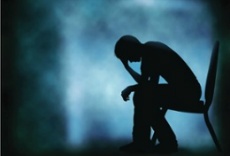What does it mean to be in recovery from bipolar disorder?
To answer that question, we sat down with Dave Wise of Dave Wise Matters, a blog focused on sharing the truth that people matter.
![]() Dave's blog explores topics of mental health recovery, faith, and life in hopes of inspiring others on their journeys. In 2016, Dave Wise Matters was voted one of the best bipolar disorder blogs by HealthLine.
Dave's blog explores topics of mental health recovery, faith, and life in hopes of inspiring others on their journeys. In 2016, Dave Wise Matters was voted one of the best bipolar disorder blogs by HealthLine.
In this interview, Dave shares his journey with bipolar disorder, discusses the healing power of spirituality, and speaks out about what’s helped him live a full and meaningful life.
Q: You've developed a great online community through Dave Wise Matters; what was the catalyst for creating the blog?
A: In June of 2015, I was frustrated with my life, my job and my relationships, and I was struggling with some depression issues too. A couple of friends (and the woman who is now my wife) encouraged me to write a blog about my experience.
Then I saw that the National Alliance on Mental Illness (NAMI) has an initiative called Not Alone where people can submit guest blogs and be published on the website.
When my blog was published, a lot of people liked it. I felt like I was able to articulate what I was feeling and what I wanted to say, and I thought, “Maybe I could do this some more!”
A couple of weeks after that I lost a job, so I had a lot of time on my hands. I thought I could connect with some of those emotions and thoughts by writing during my free time.
Q: Is there a story behind the name Dave Wise Matters?
A: Yes, it came to me because I was really struggling with believing that I mattered, or that my story was important to anyone.
 When I started the blog, I was burned out. I’ve struggled with depression, anxiety, and bipolar disorder since I was about 21 years old and I'm 34 now. There have been hospitalizations, inpatient and outpatient treatments ... and I was just really stressed out.
When I started the blog, I was burned out. I’ve struggled with depression, anxiety, and bipolar disorder since I was about 21 years old and I'm 34 now. There have been hospitalizations, inpatient and outpatient treatments ... and I was just really stressed out.
Last year I realized that I had to believe that my story was important and that I mattered before other people would believe that.
Q: What was it like when you first began dealing with bipolar and depression at 21?
A: I was in college, and I didn't know anything about mental health conditions or psychology or psychiatry. I was going through periods of depression and some hypomanic episodes, but I didn't have words for it.
Eventually I broke down in November of 2004 after the loss of a significant relationship and the stress of being a senior in college and working two jobs. I ended up hospitalized for suicide attempts.
In the years that followed, doctors, psychiatrists, and psychologists were all trying to figure out my diagnosis. Eventually they settled on bipolar disorder and I started getting medication treatment.
Also, I began doing Dialectical Behavior Therapy (DBT) on somewhat of a regular basis, which also helped in my recovery story.
Q: You've been through a lot of different treatments and protocols; has there been a particular therapy that's been really helpful for you?
 A: DBT, as well as the ten cognitive distortions listed in David Burns' book Feeling Good. That list helped me a lot.
A: DBT, as well as the ten cognitive distortions listed in David Burns' book Feeling Good. That list helped me a lot.
I started to identify when I was in “all or nothing” thinking, or jumping to conclusions, or making “should” statements.
Now I am able to redirect my hought patterns.
Q: You've written an insightful essay about how recovery from bipolar is an on-call job, as there are a lot of tasks involved in getting support, getting to doctors, and coordinating your own care. Could you describe what that's been like?
A: At times I’ve felt frustrated that some healthcare professionals didn't really understand how much work is involved for a person with a mental health condition. After all, they get to clock out at some point and go home. Even the ones that are on-call eventually rotate that responsibility.
But when you have to take care of your own severe mental health condition, you can’t just take a break. Many people are on medication that they're taking every day, as well as balancing other daily tasks such as exercise and good sleep patterns.
Some self-care that I do includes reading, crocheting, bicycling, and playing guitar. I’ve found that doing those things is important even when I don't feel like it. Sometimes it feels like a job just to do the things that keep me healthy, the things that other people may take for granted.
Q: What’s been role of faith in your life and recovery process?
A: I grew up in a church and my father's a minister, so I was always around faith communities. But as mental health issues arose in my life, people at church weren't always the most understanding or the most helpful.
Often they operated out of fear and judgment, and I experienced a lot of stigma in various communities.
However, I find that when faith communities are inclusive and try to be understanding, they can make a big impact on people with mental health conditions and aid them in their recovery journeys.
Spirituality can really make people feel like they're not alone. It can give people a sense of purpose, which is very important if they struggle with suicidal thoughts, anxiety, or depression.
Q: What are some practical things that spiritual leaders and community members can do to lessen the lingering addiction and mental health stigma?
A: First, just get to know people's stories without any sort of ulterior motive, on a friendship level.
I recommend a book called Souls in the Hands of a Tender God by Craig Rennebohm; he is a pastor in Seattle working with individuals that were homeless and experiencing mental health conditions.
 He stresses a companionship model, where there's mutuality ... I've experienced that in my own life and that's been the most helpful.
He stresses a companionship model, where there's mutuality ... I've experienced that in my own life and that's been the most helpful.
Sometimes when people think that they know how to fix you, they enter into a relationship with you with that helper-helpee lens, and it doesn't always work.
I suggest that ministers or church leadership attend the free programs that NAMI offers on how to be supportive of people with mental health conditions.
It’s also helpful if they invite licensed professionals such as psychologists or psychiatrists or social workers to come and speak at their church about mental health conditions. That way, they can educate the rest of the congregation on what's fact and what isn't.
For a long time people thought that depression and mental health conditions were a spiritual problem and not at all a medical issue. I think that they can be a combination of both … so if you've only gone to seminary and you don't know about mental health conditions, then you’re at a disadvantage.
Q: Are there any other specific resources that you recommend for people wanting to learn more about bipolar?
A: Besides NAMI, I recommend an online magazine for people with bipolar, BPHope.com. They have a lot of resources and good information.
For people struggling with suicidal thoughts or the loss of a loved one, the American Foundation for Suicide Prevention (AFSP) is another great resource. They provide lots of literature on mental illnesses such as depression and bipolar that can lead to suicide and how to cope. They provide free mental health first-aid throughout the country, helping people learn the signs and symptoms of a mental health condition and how to intervene. They also provide support groups.
Finally, there’s the National Suicide Prevention Lifeline, and their number is 800-273-TALK (8255). They're licensed professionals available every day, all day, all night. If you're struggling with a mental health condition or suicidal thoughts, you can call and they can get you help in your area.
Q: You’ve written about how your dog Rocky saved your life. How has he helped you in your recovery?
 A: When I got Rocky, I was living by myself and I still had somewhat regular experiences of suicidal ideation.
A: When I got Rocky, I was living by myself and I still had somewhat regular experiences of suicidal ideation.
Knowing that I had to get up the next day to take him for a walk and make sure he got fed … sometimes that was all the motivation I had to keep me going through that night.
Knowing that Rocky depended on me really encouraged me to keep fighting.
Also, he's a lot of fun. Pets can bring people so much joy. Rocky makes me laugh, which is good for a person with mental health conditions!
Q: What does bipolar recovery look like for you today?
A: For me, bipolar recovery means me being well enough that I have the freedom to make my own life decisions and to live a life with meaning and purpose.
At certain times in my life, that hasn't been possible because of the hospitalizations and different treatments that I've undergone.
In the last couple of years, I've been able to work part time and have meaningful friendships, and relationships. I'm married, and I’ve started developing better habits with eating and exercise and sleeping on a regular schedule.
The key is that those were all my choices that I was able to make for myself. It wasn't some caseworker or doctor telling me … It was all my choice. The autonomy to make self-directed choices in my life to stay well is how I define recovery.
Q: What do you wish more people knew about bipolar or about mental health in general?
A: I wish that people realized that bipolar disorder often doesn't look the way it's portrayed on TV and in movies. It's not always extreme mood swings and mania. Rather, it's a spectrum of highs and lows that can go for long periods of time or happen very quickly. It looks different with each person.
In terms of mental health conditions, I wish that people understood that they’re actually very common. There's no need to feel bad that you’re experiencing one. It's treatable and there are groups out there, organizations that can help people get the help that they need to live meaningful lives.
Bipolar disorder or schizophrenia is not a death sentence.



